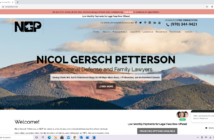Mentoring, along with co-working and mingling with entrepreneurs, has helped Chris Brown launch a Kansas City practice serving startups.
Chris Brown successfully launched a solo law practice in Kansas City that specializes in helping business start-ups by looking and acting like a start-up himself.
His office is in a renovated three-story brick building in downtown Kansas City called Thinking Big Co-working, where he has a small private office and shared use of office equipment and conference rooms. He eschewed the conventional practice of naming his firm after himself, choosing to call it Venture Legal LLC instead. Most of the work he does is on a fixed-fee basis. Perhaps most importantly, in an entrepreneurial hotspot that likes to call itself Silicon Prairie, he mingles on a daily basis with other entrepreneurs in his office building and in half a dozen mentoring programs around town.
His firm’s early success has come as something of a surprise to Brown. After law school, he worked as an associate specializing in incorporations and business law with a 14-attorney Kansas City law firm, Van Osdol & McGruder, PC, before leaving to start a legal marketing company, b.Legal Marketing. But at the law firm, he had enjoyed doing legal work for startups, and he didn’t want to leave all his clients behind. So he launched the law firm simultaneously, “mainly as a hobby.”
He expected it to be “a part-time gig,” Brown says, “But a lot of people appreciated the fact that my firm had such a different way of working, so my practice took off.” He has pulled in enough legal business that days after Venture Legal celebrated its first anniversary at the start of 2015, Brown took on an associate.
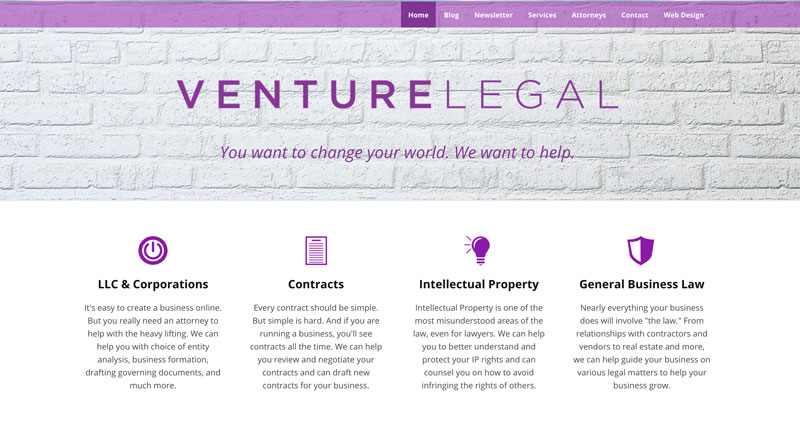
Unconventional Name Recognition
Venture Legal is riding a mini-boom in entrepreneurial activity in Kansas City that Brown attributes to a convergence of events about four years ago. The Kansas City-based Kauffman Foundation, which he says is “the largest nonprofit in the world that supports entrepreneurship,” got a new CEO who decided to place a greater emphasis on its hometown. At about the same time, Google picked Kansas City as the first test city for the roll out of its Google Fiber ultra high-speed internet service, and the City Council passed a resolution setting a goal of making Kansas City the most entrepreneurial city in the nation.
“All of those forces came together, and now it is beginning to pay off,” says Brown. “There are startups popping up all the time. Some have actually gotten pretty big. We haven’t had any huge Facebook-style successes, obviously, but we’re getting there. There is certainly enough activity now to justify having a law firm that focuses on that one area.”
Brown’s choice of names was one of the first important steps he took to establish an entrepreneur-friendly identity for his firm. “A huge percentage of law firms are just people’s last names: Brown, Brown & Brown. That’s pretty boring. Calling my firm Venture Legal sets me apart,” he says. The slogan just below that name on the firm’s web site – “You want to change your world. We want to help” – also emphasizes that the firm’s specialty is helping to launch startups.
“It’s amazing how many firms have the same marketing pitch: ‘We get results.’ Or ‘We’re small but we’re big,’ or vice versa. Okay, but what the heck does that mean?” Brown says. “My brand is very different, and I have been very consistent in the way I use it. I use my logo everywhere, and I don’t deviate from it. It helps people remember who I am.”
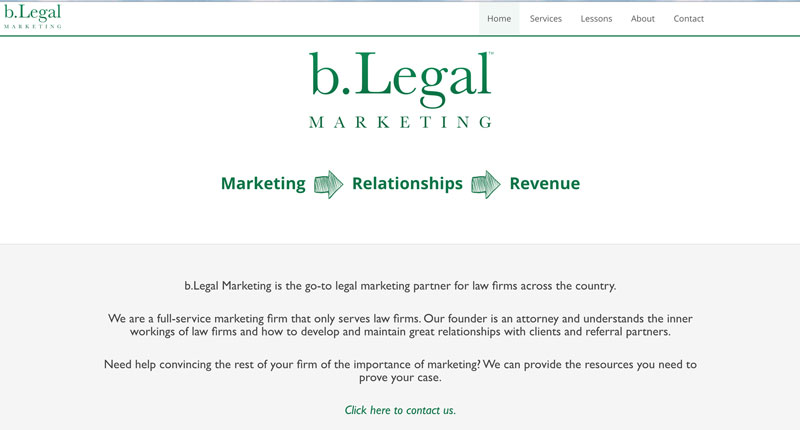
Pros and Cons of Co-Working
His unusual office space is arguably Brown’s boldest branding gambit. It leaves no doubt that Venture Legal is an unconventional law firm. “I am in a co-working facility where there are a ton of other companies. The building is over 100 years old and it has the original hardwood flooring. But it’s very modern inside, with glass walls, so it looks really cool. And we have video games. There’s a keg up on the third floor that we can use on Friday afternoons and a deck on the roof. It is a fun place to work.
“I have my own little private office, but there are meeting rooms that we can reserve, and also open-air meeting spaces with couches and other furniture that we all share. We also share a copy machine, a fax machine, the coffee machine and all those things, which allows us to reduce costs. My overhead is ridiculously low.
“I’ve got some issues with confidentiality of course, because my clients have a right to have all of their stuff confidential. So anytime I am in a common area and a phone call comes in, I have to step into a private meeting room. And I can’t leave my computer on or papers on a desk.” He alerts clients coming to his office for the first time that he has glass-walled space in a building crawling with budding entrepreneurs. He’ll make sure they’re okay with meeting him in such a public space, or he’ll suggest a more anonymous meeting place. Brown acknowledges that such an office space wouldn’t sit well with the clients of an attorney doing, for instance, trusts and estates. “But my customers love where I work,” he says.
Venture Legal’s billings are as stripped down as the firm’s office space. About 90 percent of the work that the firm has handled to date has been on a fixed-fee basis. “I never have to discuss hourly issues with my clients. We don’t have five different attorneys at five different rates. I know the value of my service, we have one rate and that’s what we charge,” Brown says. “Basically, I’m trying to build a law firm based on a business model, not a law firm model. Clients are really receptive to that.”
Thanks to the low overhead, he is able to charge about 25 percent less than he charged at his prior firm. “But my goal is not to be cheaper. My goal is to be more efficient and more helpful to my clients. I am constantly getting referrals for new business based on that. The entrepreneurial community here knows that it is easy to work with my law firm,” he says.
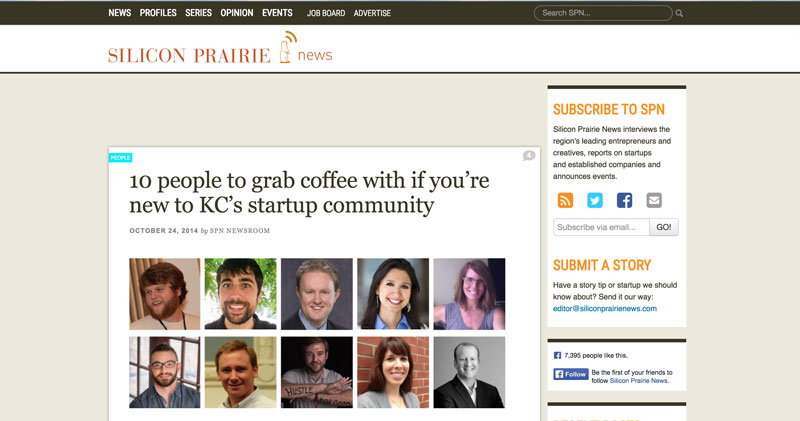
Marketing Through Mentoring
A number of mentoring programs for entrepreneurs have sprung up in Kansas City in recent years. Brown founded several of them, including Innovative Professionals for Entrepreneurs, which brings realtors, bankers, accountants and lawyers together with entrepreneurs in to help them “get connected and get answers to their questions.” He also has been a regular, prominent presence at periodic events called startup weekends, where entrepreneurs compete to develop the most compelling business pitch. Continuing a practice that he began at his prior firm, Brown offers a free business formation package to the winning team.
His reputation as a go-to lawyer for startups in Kansas City was burnished in a recent issue of Silicon Prairie News, which named him as one of the top 10 people in town who anyone wanting to start a business should meet for coffee. He responded by announcing on his blog that he would buy coffee for anyone who showed up at his favorite coffee shop at the appointed time.
Speaking of all the pro bono mentoring he does, Brown says, “I do that in part because I love it, but it’s also great marketing. I don’t have a huge budget to spend on marketing, but I sponsor all kinds of events and give my time. That has been a great way to establish my brand, and bring in business.”
Brown says he is careful to avoid the potential hazards of offering free legal advice to non-clients. “I am pretty clear with people about what is mentoring and what it is not,” says Brown, who sticks to generalities in his pro bono sessions. “I also do a decent job of managing who and when I meet somebody for free,” he adds. “If I hear from people who have a concept that is just not ready to get off the ground, I will usually try to meet them at a networking event. But if I can tell that somebody is seriously ready to move, I will try to meet with them for coffee first thing in the morning. A lot of entrepreneurs don’t like that, but if I can meet somebody at 8 and be in my office at 9, it’s not that big a deal to me. Or I will meet somebody for lunch or after hours. I try not to take those meetings in the middle of a workday because that interrupts my workflow. I do a ton of free mentoring, but it is great marketing, and I don’t mind helping people,” Brown says.
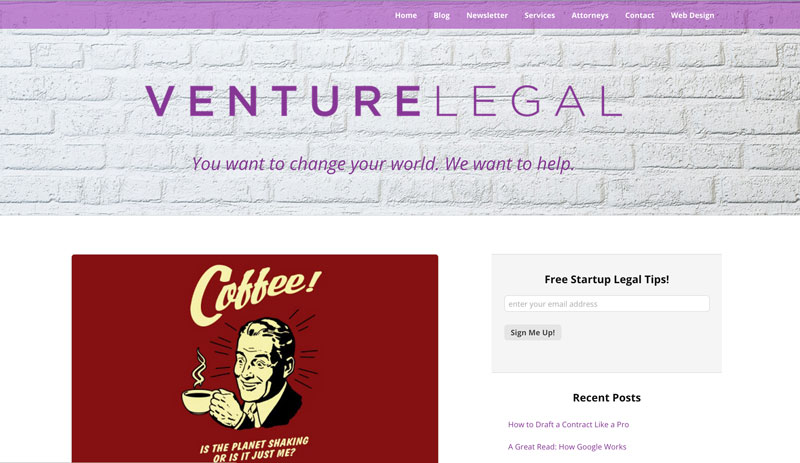
The Importance of an Online Presence
Brown uses a number of other standard methods of marketing his law practice, and finds some of them to be invaluable. Blogging and emailing “are probably the most cost effective marketing tools that anybody can deploy,” he says. An emailed newsletter is a well-worn legal-marketing vehicle which can help well if done right, he says. “If you send out boring newsletters, people unsubscribe. But if you provide fun and interesting content that helps people, they will enjoy it and respond well to it. And if you can send it to 100 people every month, and it takes you a couple of hours to put together, all you need to do is pick up one client or one new project to make it absolutely worth your time.”
Law firm web sites are also “incredibly critical,” adds Brown, whose own web site was named one of the top 10 law firm web sites in the nation by Lawyerist.com last year. “Something like 75 percent of adults looking for an attorney will look online for information about lawyers, and the main thing they want to see is whether you are credible. If a potential client goes to your web site and you look like you don’t know what you’re doing, and you haven’t listed your awards and commendations when all of your competitors have, they’re going to think you are not a good lawyer even if you’re the best in the city. So even if your web site may not bring in business, it can cause you to lose business. That’s why I think a web site is so important.”
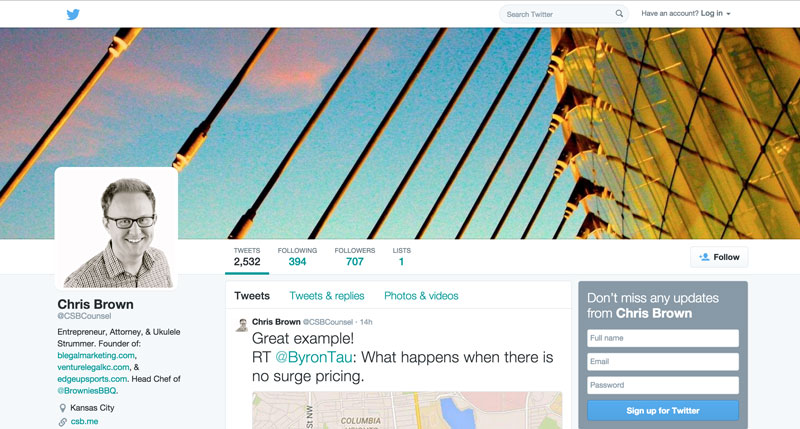
How He Drives Traffic to His Website
Venture Legal does not have its own Facebook page. Brown is not convinced that a law firm needs one. “In my opinion it matters much more for the individual lawyers to have a social media presence and to make it known that they are a lawyer,” says Brown, who links to his blog posts on Facebook and also on Twitter. All of that helps optimize his website for search engines. “We’re really big on making sure that if you search ‘Kansas City startup lawyer’ and other similar phrases, we’re on the first page of the Google results, and we are. I check that pretty constantly,” Brown says.
Lawyers in some specialties may have little to gain from being active participants on Twitter, Brown says. “If your clients are not on there, you may not need to be on there engaging. But even if your clients are not on Twitter, you should be on there as an observer. You can follow news and industry experts and so on to keep up to date on your own industry. And you can follow your competitors, your clients and opposing counsel.”
Brown counts himself as a very active participant on Twitter, which is perhaps de rigueur for a lawyer seeking business from the young and wired. “It works for me because all my clients are on Twitter. So I’m always on there sharing news, talking to people and doing things. My clients see that and they will link back to our website, or they can see I am commenting on a law that will impact their business and then they will reach out to me,” says Brown. “For me, it is a great business promoting tool. Twitter is awesome.”


